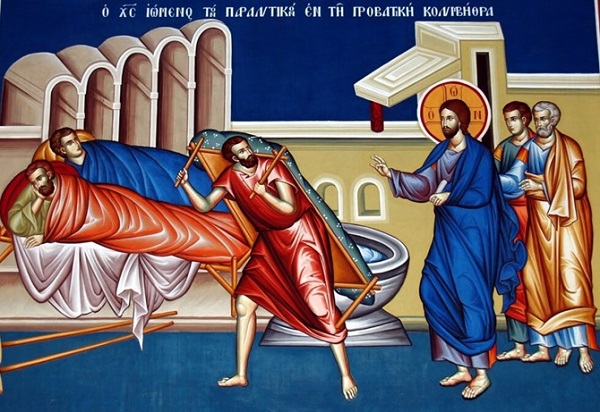Christ’s miraculous cure in Capernaum
13 March 2023The Gospel extract which is read on 12 March 2023 is from Mark (2, 1-12) and concerns the cure of a paralyzed man in Capernaum.
The Lord was teaching in a certain house and so many people had come that there was no room to move. Four men were carrying a paralyzed man on his bed and wanted to take him to Christ, in the certainty that the Lord would cure him. Since there was no way through the crowd, they went up onto the roof, removed some of the tiles and let the man down in front of Christ. He admired their faith and told the invalid that he forgave him his sins. The Scribes who were there were scandalized and wondered who he thought he was to forgive sins, since only God has that authority. The Lord read their thoughts and asked: ‘Why are you thinking this? Which is easier: for me to say, “Your sins are forgiven you” or to say “Take up your bed and walk”? But I’ll show you that I do have the authority to forgive sins’. And he turned to the paralyzed man and told him to get up and go home, which he promptly did, much to the astonishment of all.

Christ came into the world with his human and divine natures united; he is both God and human. People couldn’t understand this, particularly the Scribes and Pharisees, who considered themselves perfect and all-knowing and were envious of Jesus. At the end of the reading, we hear that, after the miracle, those present glorified God, but it’s likely that the Scribes who were there would have been displeased and troubled.
As regards the remission of sins, I’d like to quote from a book by Bishop Agathangelos of Fanari, entitled «Η ζύμη του ευαγγελίου» (The Leaven of the Gospel), and in particular from page 94, which deals with this Gospel reading.
Remission of sins
Remission of sins is offered by the Church through the sacraments. The Lord’s voice of salvation, heard by the paralyzed man when Christ said: ‘Son, your sins are forgiven you’, is the same as we hear when we approach the sacrament of confession with humility and self-censure. If sin is spiritual death, repentance and the remission of sins is life and resurrection. If sin makes us prisoners and darkens our mind, remission of sins is the event which makes us a person, because people are persons only when they’re linked to the Person of the Triune God.
Let’s transform ourselves, therefore, with the practice of the faith and together with this, the practice of all the other Gospel virtues: love, prayer, fasting, worship of God, wisdom, meekness and restraint. In this way we unceasingly increase ‘the increase of God’ (Col. 2, 19), until we, too, become both human and also gods by grace.
So God forgives people when they confess sincerely and, through the sacrament of Holy Communion, he provides them with their ticket to paradise. The phrase ‘Remember me, Lord, in your kingdom’, which we hear all the time when we take communion, is an entreaty to him to vouchsafe our welcome in his kingdom.






